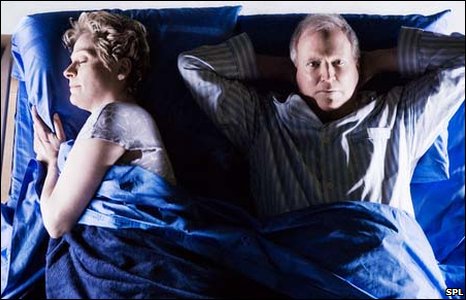Have you grown older and are not able to get a deep spell of sleep in the night Insomnia in elderly people can be due to the use of medications, physical problems, social settings and psychological conditions associated with old age.
Why do the elderly have a problem in sleeping The sleep of the elderly is often disturbed by a brief period of wakefulness or sleeplessness during the night. In such cases, it is the quality rather than the quantity which is most affected. With age, there is a gradual reduction of periods of deep sleep. The older persons, therefore, get roused easier. Sleep necessities also diminish with aging. From nine hours of sleep per night at the age of 12, the average sleep needs to decrease to eight hours at the age of 20, seven hours at 40, six and a half hours at 60 and six hours at 80. There also appears to be a tendency among the older individuals to advance their usual bedtime with age and to arise at an earlier hour.
There are Various Factors Causing Insomnia in Elderly People
The amplitude of the body temperature and melatonin-production decreases, while insulin production increases when you grow older.

You might wake up earlier in the day than younger counterparts, perhaps, because light exposure is interrupting sleep and throwing off the sleep-wake cycle. Old age can disturb the circadian rhythms and one of the possible reasons could be that humans over 80 years of age tend to have fewer SCN (Supra Chiasmatic Nucleus) Neurons and a smaller SCN.
You can see changes in your sleep pattern that comes with aging like early waking and fragmented sleep. Changes in sleep patterns cause problems related to sleeping in most older people. Normally, about 15% of the sleeping time of elderly people is in stage 1, which is called light sleep. In infants, only 5% is spent in light sleep.
Around 18% of older people between 55 to 95 years old have difficulties falling asleep. Around a third of them woke up often during the night and one-fourth of them woke up too early in the morning. In a study conducted in 2013, 33% of adults between 55 and 64 years old did not feel refreshed when they woke up.
As you grow older, sleep patterns change. As an elderly person, you may complain of waking up repeatedly within the night, wake up earlier, and report waking up feeling unrefreshed. The quality of life can be worsened with sleeplessness in the elderly.
Old age itself is not the single most cause or risk factor for insomnia in the elderly. Several factors may interfere with your sleep as you grow older :
- You may be suffering from Painful medical conditions that are common in the elderly and pose a high risk for insomnia. These conditions include arthritis, gastrointestinal distress, frequent urination, lung disease, and heart diseases.
- Neurologic diseases in the elderly, such as restless legs syndrome, Parkinson’s, Alzheimer’s can also cause insomnia in the elderly.
- You might be taking several prescription drugs whose side effects include insomnia.
- Elderly people are more prone to grief, depression, and anxiety, emotional factors that can cause insomnia or sleeplessness. Keep yourself away from these types of problems. Relaxation can be of great help here. Psychologic factors, such as anxiety and depression, are more likely to cause insomnia than illness, medications or other conditions.
- Lack of movement and physical exertion among the elderly also contribute to their need for less sleep than younger persons have. Many sleep difficulties have their origin in a lack of movement and physical fatigue and the absence of demarcation between day and night. Make a daily routine for simple exercises. A long evening walk can help you in getting some physical exertion and movement.
Although Insomnia in the elderly is not inevitable. While older people are more susceptible to many conditions that cause insomnia, treatments and a healthy lifestyle, regular exercise, are as useful in providing relief to the elderly as to the young. Keeping the body healthy in older age can decrease the risk of insomnia.
Exposure to bright light in the evening may result in improved sleep patterns and less wakefulness in the night.